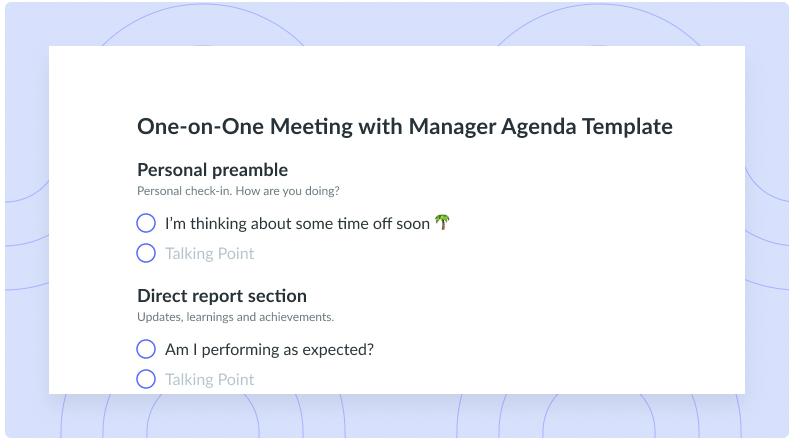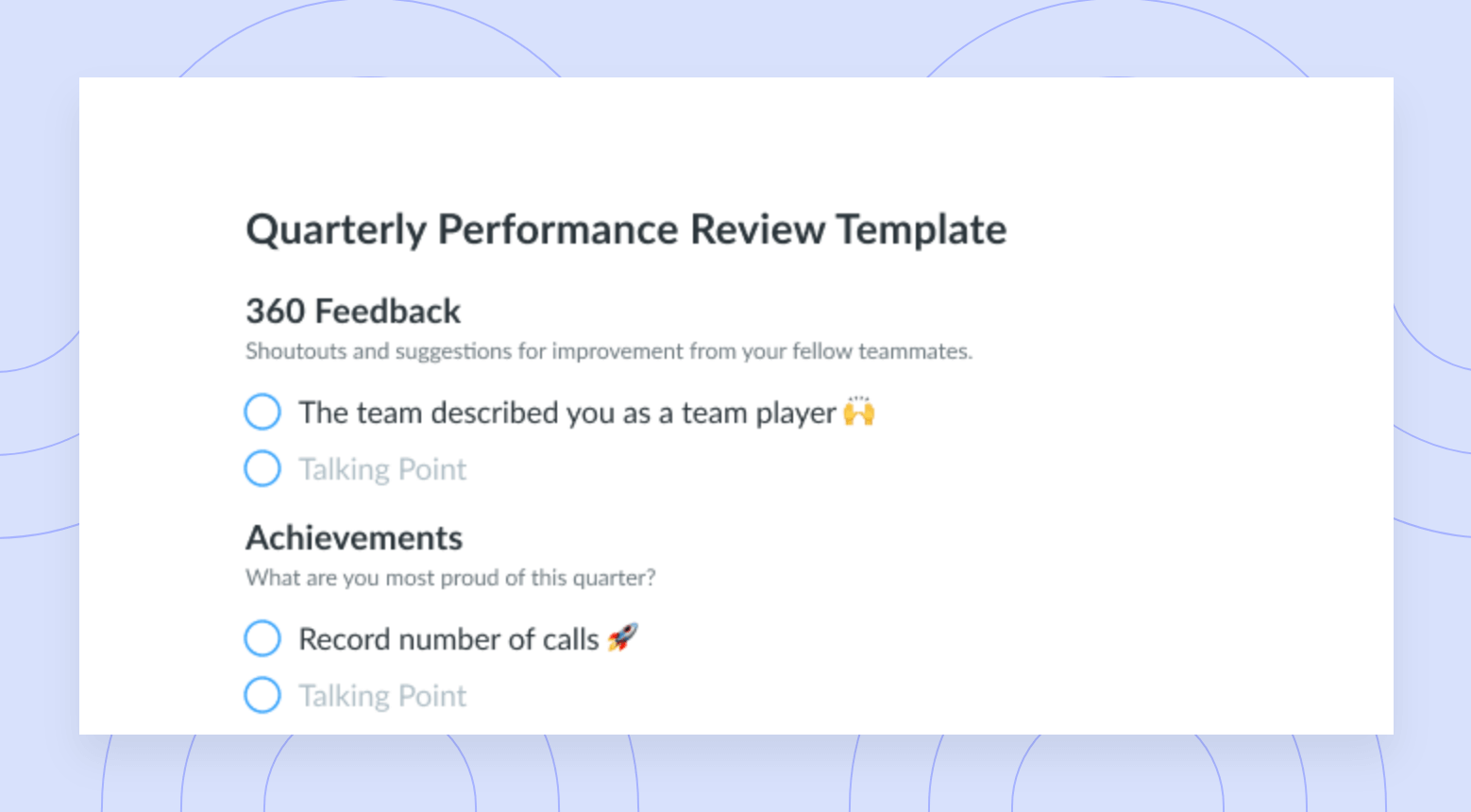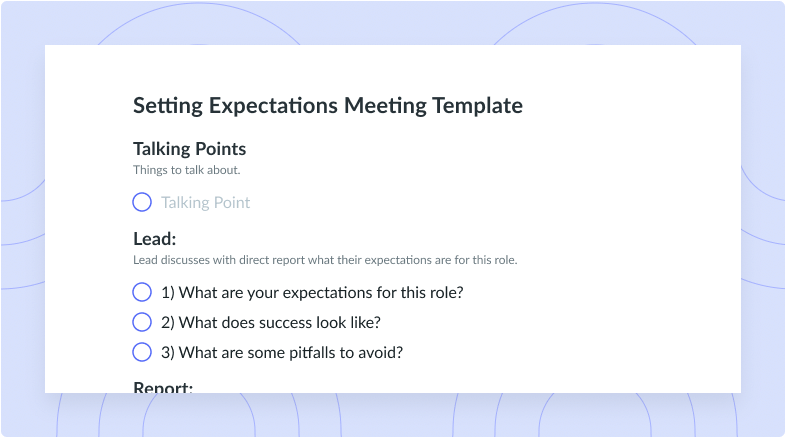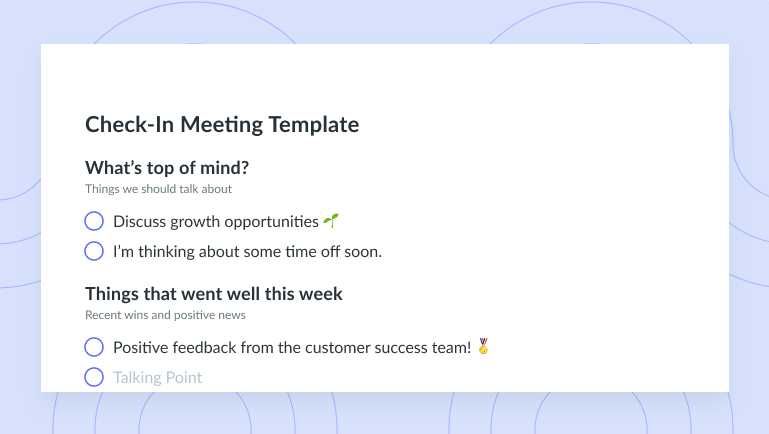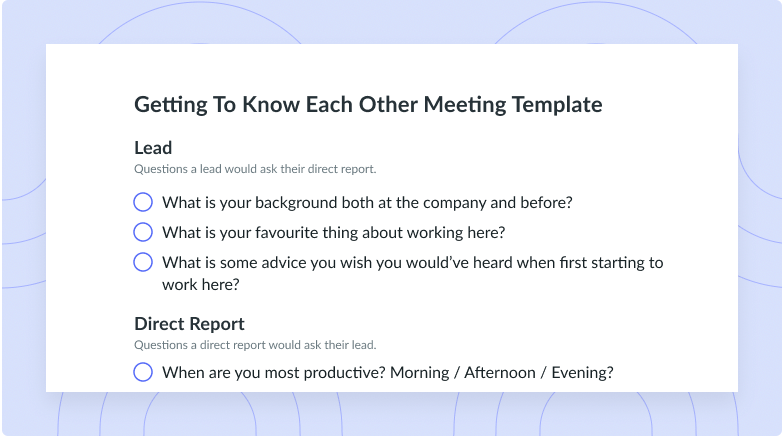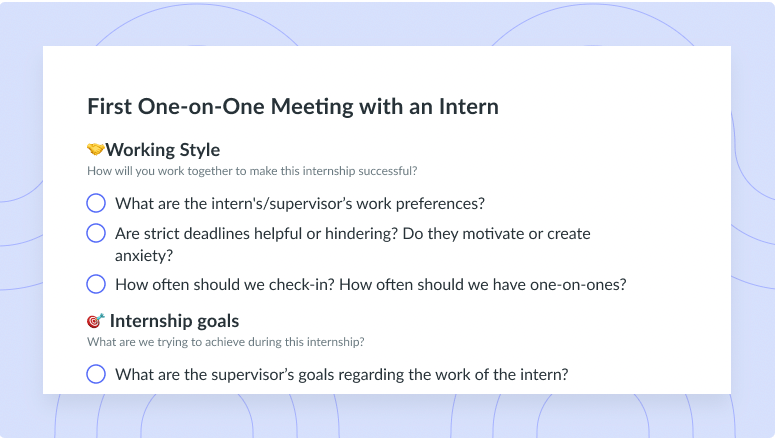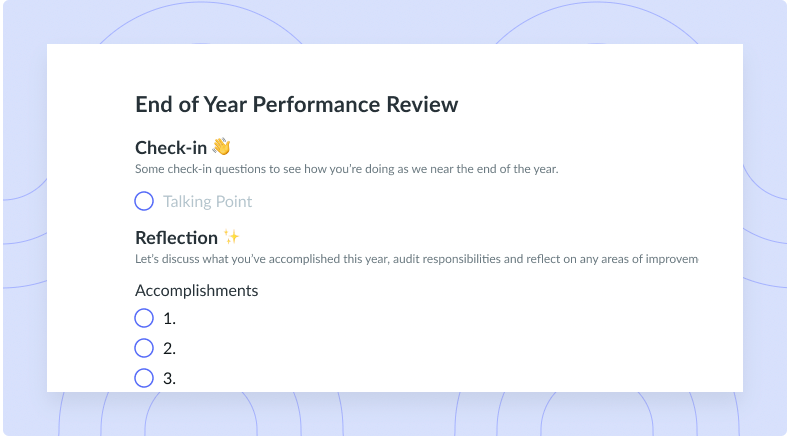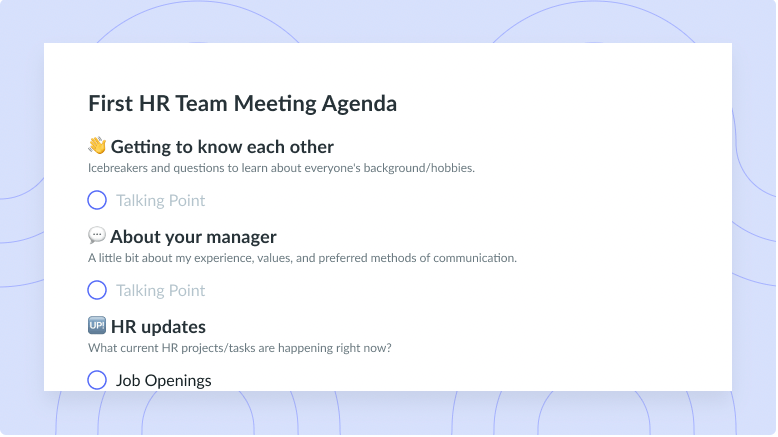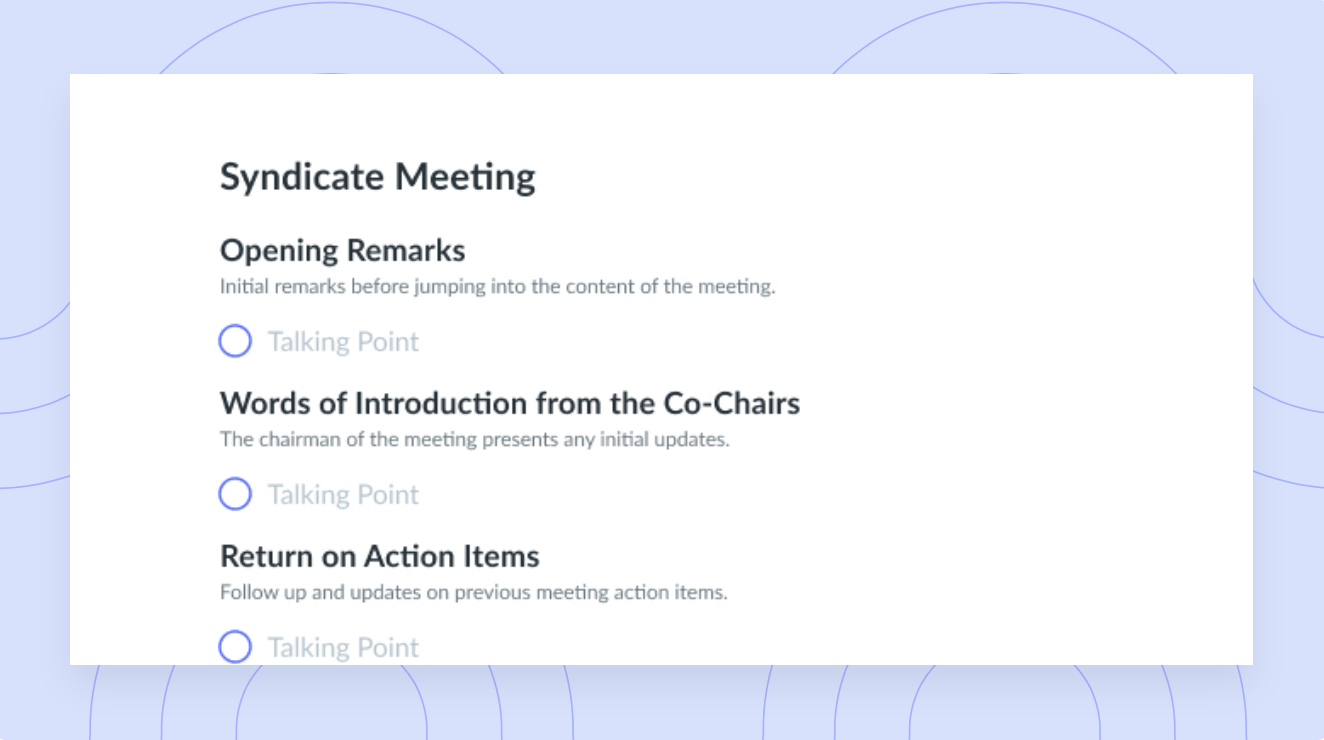200 One-On-One Meeting Questions for Engaging Conversations
The best questions to check-in with your direct reports, set expectations, and coach them on their career goals.
The world’s best managers know the importance of meeting regularly with their employees. One-on-one meetings empower you to get to know your teammates, coach them on their priorities, and exchange ongoing feedback on their performance.
Kim Scott calls them “your must-do meetings” in the book Radical Candor:
“1:1s are your single best opportunity to listen, really listen, to the people on your team to make sure you understand their perspective on what’s working and what’s not working,” says Scott.
In High Output Management, Andy Grove says every manager should meet regularly with their direct reports to discuss opportunities for growth:
“It is the principal way their business relationship is maintained. Its main purpose is mutual teaching and exchange of information,” says Grove.
Julie Zhuo (author of The Making of a Manager) argues that sharing your time and energy during one on one meetings goes a long way towards building healthy relationships:
“Even if you sit next to someone and see them every day, 1:1s let you discuss topics that may never come up otherwise — for example, what motivates them, what their long-term career aspirations are, how they’re generally feeling about their work, and more,” says Zhuo.
Even if you know the benefits of one on one meetings, it can be tough to come up with ideas and conversation topics every time you have one. That’s why we compiled a list of 200 one-on-one meeting questions you can use to have more meaningful conversations with employees.
- One-on-one meeting structure
- The importance of one-on-one meetings
- 200 one-on-one questions for engaging conversations
One-on-one meeting structure
Having too much structure can constrain meeting attendees, but not having enough structure can lead to unproductive one-on-ones. Thus, finding the perfect balance of structure in your one-on-ones is important to achieve productive and delightful meetings.
To find the perfect structure for your one-on-one meetings, it’s important to circulate through talking points. For example, in a one-on-one meeting with your manager, a way to balance structure is to allocate time for a personal check-in, direct report’s section, manager’s section, priorities section, development and growth section, and action items section. This way, talking points are distributed throughout the agenda with structure but in a way that allows attendees the freedom to add talking points where they see fit.
Pro tip: Struggling to find the perfect balance of structure in your one-on-ones? Use one of Fellow’s 500+ pre-built templates to foster positive work relationships, set expectations, and help your direct reports be more productive!

In terms of meeting frequency, this depends on the employee and culture. For example, weekly one-on-ones are beneficial if you manage a smaller team. However, if you manage a larger team, bi-weekly one-on-ones may be more realistic. According to Yolanda Lau, Co-Founder and Advisor at FlexTeam and CXO at Liquid,
“Managers should have a weekly one-to-one scheduled with each direct report. It is understandable if it needs to be rescheduled in a specific week or if it doesn’t happen from time to time. But in my experience, managers should aim to have one-to-one meetings at least three out of every four weeks.”
The importance of one-on-one meetings
- Foster positive work relationships
- Boost employee productivity
- Help you discover and address issues proactively
- Provide a culture of continuous feedback
1Foster positive work relationships
Fostering positive work relationships is one of the most important things you can do to have a productive workplace. When employees have positive relationships with each other and management, they are more likely to contribute their ideas and collaborate more effectively. According to Eric Mosley, co-founder and CEO of Workhuman,
“employees who feel a deep sense of affiliation with others on their team are driven to take positive actions that benefit the business – actions they may not otherwise even consider.”
Furthermore, Kim Scott, author of Radical Candor, explains,
“The most important thing you can do to build trust is to spend a little time alone with each of your direct reports on a regular basis. Holding regular 1:1s in which your direct report sets the agenda and you ask questions is a good way to begin building trust.”
2Boost employee productivity
According to Gallup’s State of the American Manager report, employees who meet regularly with their managers are almost three times as likely to be engaged as employees who don’t. Andy Grove, former CEO of Intel who grew Intel’s revenue from $2,672 to $20.8 billion in less than 30 years and wrote the book High Output Management, explains that one-on-one meetings save your team time by helping you develop a common base of information and similar ways of handling situation, helping your team stay in sync. Grover says,
“Let’s say you have a one-on-one with your subordinate every two weeks, and it lasts one and a half hours. Ninety minutes of your time can enhance the quality of your subordinate’s work for two weeks, or for some eighty-plus hours, and can also upgrade your understanding of what they’re doing.”
3Help you discover and address issues proactively
One-on-one meetings are an opportunity to address issues proactively. It’s the manager’s job to help employees solve their issues by coaching them through the problem-solving process to avoid issues becoming big problems in the future. According to Grove,
“The meeting should cover anything important that has happened since the last meeting: current hiring problems, people problems in general, and- very, very important- potential problems. Even when a problem isn’t tangible, even if it’s only an intuition that something’s wrong.”
4Provide a culture of continuous feedback
Research shows that employees who receive consistent feedback feel more fulfilled in their jobs. With regular one-on-ones, there is more opportunity for giving and receiving feedback. Thus, one-on-ones are essential as they provide an opportunity for feedback and encourage a culture of continuous improvement. With Fellow, it’s easy to incorporate feedback into every one-on-one meeting and track progress over time in prebuilt meeting templates, which help create feedback requests without making it uncomfortable.

200 one-on-one questions for engaging conversations
We compiled the best one-on-one questions and divided into 16 different categories.
We guarantee they’ll spark some great conversations with your fellow teammates…
- Set expectations and get to know each other
- Check-in with direct reports
- Hobbies, family, and personal life
- Priorities and productivity
- Employee engagement
- Challenges and roadblocks
- How to improve as a manager
- Sharing feedback
- Talking about growth
- Career goals and aspirations
- Help employees develop ideas
- Team dynamics
- Company culture
- Meeting feedback
- Remote work
- What to ask at the end of your 1:1
🤝 Questions to set expectations and get to know each other
Questions about setting expectations and getting to know each other should be asked at the start of a relationship, for example, when a new employee joins your team. By doing so, you’re guiding them in the right direction with clarity instead of throwing them in blindly. This will help drive productivity and prevent fewer mistakes down the road. It’s also important to continue asking these questions throughout the relationship, as expectations may change along the way.
1. What are your expectations for this role?
2. What are you excited about?
3. What does success look like?
4. What are some pitfalls to avoid?
5. Why did you decide to work here?
6. Is there anything that you’d like to know about me?
7. What makes 1:1s the most valuable for you?
8. Who is the best manager you’ve ever had? What did you like about them?
9. How do you like to be praised, in public or in private?
10. What’s your preferred method of communication?
11. How do I know when you’re in a bad mood or annoyed?
12. Are there things that always put you in a bad mood that I should be aware of?
13. Are there any manager behaviours that you know you dislike?
14. Do you have any career goals that I should know about so I can help you achieve them?
15. Any surprises since you’ve joined, good or bad, that I should know about?
👋 Questions to check-in with your direct reports
Asking questions to get to know someone should be asked at the beginning of a relationship to build trust. It’s also important to continue asking these questions throughout the relationship, regardless of how long it is. This ensures that you’re continuously building trust.
16. What’s top of mind? What are some things you’d like to discuss?
17. What did you get up to last week that I might not know about?
18. What are some things that went well?
19. Is there anything you weren’t very happy about?
20. What did you learn?
22. What were your priorities since we last met?
23. What will your priorities be from now until our next meeting?
24. What can I do to help?
🚴 Questions about your direct report’s hobbies, family, and personal life
Questions about your direct report’s hobbies, family, and personal life should be asked at every stage of a relationship. These questions facilitate trust and strength relationships, two critical things to boost productivity and foster a positive work culture.
25. How’s life outside of work?
26. How’s your work/life balance lately?
27. What are some of your hobbies outside of work?
28. How was your weekend? / What did you get up to this weekend?
29. Do you celebrate [holiday]? How was it?
30. What are your favourite podcasts/books?
31. How are things with your family?
32. As a kid, what did you want to be when you grow up?
33. What are some of your personal goals this year?
34. What are you reading these days? Is there anything on your target list?
35. What is one belief that you’ve had your whole life that you think has helped you become who you are today?
36. If you were to give your younger self some advice, what would it be?
🎯 Questions about priorities and productivity
Asking questions about your direct reports’ priorities and productivity is a great way to foster alignment and stay informed. These questions should be asked at every stage of a relationship since priorities are constantly changing. Additionally, these questions can provide an opportunity for your direct report to open up about blockers so that you can help coach them through problem-solving.
37. What are your top priorities right now? What can we do to help you with this?
38. What percentage of your time do you spend in meetings vs. doing deep work?
39. What would you like to spend more time on?
40. What would you like to spend less time on?
41. How is [project X] going? / How do you feel about [project X]?
42. When do you get your best work done? Morning / Afternoon / Evening?
43. How do you like to organize your day?
44. How do you plan out your week?
45. What are the biggest time wasters for you each day/each week?
46. How do you know that you’ve had a productive day?
47. How could I help you be more productive?
48. Are there any software, tools or resources that you think you could benefit from?

Pro tip
Use a meeting management tool like Fellow to show up prepared for all your one-on-one meetings by adding questions or talking points to the meeting agenda in advance!
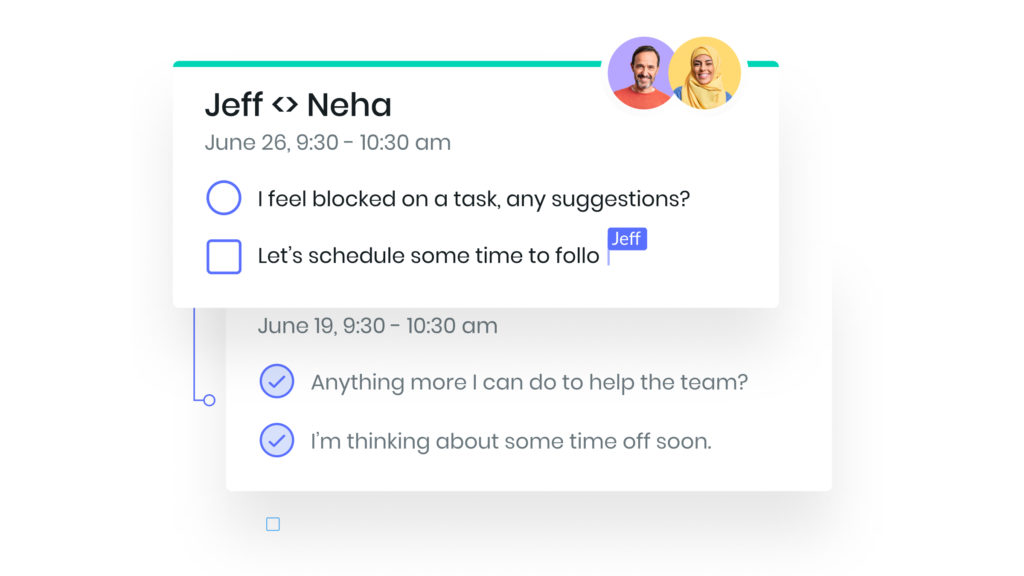
😊 Questions to ask about employee engagement
Questions to ask about employee engagement are important at every point in a relationship. Try out the below questions to reap the benefits of more engaged employees!
49. How does your work compare to your expectations when first starting here?
50. Do you feel that your work is appreciated?
51. What motivates you to come to work each day?
52. How often do you get to use your strengths at work?
53. What kind of a workplace would help you be the happiest version of you?
54. What is your favourite part of your job?
55. Is there anything about your job that you really don’t like?
56. In the past month, what have you been happy about?
57. In the past month, what have you been less happy about?
58. After [X] years at [company], how do you feel overall?
59. What are the things you’ve done at this company that you’re the proudest about?
60. What’s one new thing you’d like to work on or do differently?
61. What’s one thing we could do to make your work here more enjoyable?
62. What’s something I can do to make work better for you?
63. What are you working on that you don’t want to work on?
64. Do you not want to work on it because you aren’t interested or because you think it’s not important?
65. Are there any projects you’d really like to work on?
66. What would need to happen in the next week at work to give you great satisfaction?
67. On a scale of 1–10, how happy are you at work?
68. What’s something I could do to get you to a 10?
🚧 Questions to address challenges/roadblocks/concerns
During one-on-ones, asking questions regarding challenges/roadblocks/concerns is important as they are inevitable in the workplace. Having a trusted source to talk through these issues with is very important to help you solve them before they become more significant, harder-to-manage problems. Thus, regularly asking questions at every point in your relationship regarding challenges/roadblocks/concerns provide your direct reports with an opportunity to express their thoughts and seek guidance.
69. When have you felt stressed or overwhelmed in the past month? What can I do to prevent that?
70. Are there any obstacles that prevent you from doing your best (obstacles at work, or if you want to talk about it, personal)?
71. Is there anything right now that is slowing you down or blocking you?
72. Is there an aspect of your job that needs more help or coaching?
73. What are some challenges you’ve faced recently? How can we work them out together?
74. Is there anything blocking you from getting your work done?
75. Is any part of your job unclear or confusing?
76. If you had to point to something that was holding you back or slowing you down in achieving your goals, what would you say that would be?
💪 Questions to receive feedback and improve as a manager
Regardless of how much experience or education you have as a manager, you always have something to learn. Thus, it’s important to receive feedback and improve as a manager when you’re a new manager or an experienced one. Your employees are the most knowledgeable regarding how effective your management style is, so leveraging this knowledge will only improve your management skills.
77. What’s something I should consider changing or start doing to improve my leadership style?
78. Would you like more or less direction from me?
79. What would you do differently, if you were me?
80. Is there anything I could do to invest more in your growth?
81. What’s one thing that you think I don’t want to hear but that would be good for me to hear?
82. If you were in my shoes, what would you change with the team?
83. Do you feel that I represent the team well to the rest of the company? What would you change?
84. Do you feel like I acknowledge/recognize the positive work that you do?
85. What’s your favourite thing I do as a manager?
86. What could I do to help us work better together?
87. What feedback do you have for me? Both positive and constructive?
88. What could I be doing better as your manager?
89. What do you like about my management style?
90. Can you think of something I’ve done or said recently, that did you didn’t like or agreed with?
91. Is there something I’m doing that I could delegate to someone on the team?
🎁 Questions to give feedback
Giving your direct reports feedback is an important way to help them grow professionally and improve their productivity. Therefore, during every stage as a manager, it’s important to ask questions to give feedback to help your employees reach their highest potential.
92. Do I give you enough feedback?
93. Do you prefer to get feedback in writing so you have time to digest it or are you comfortable with less formal verbal feedback?
94. What is the best feedback that you’ve gotten in the last 90 days?
95. What’s one thing/area you think you can work on?
96. What’s one thing you think you should do more of?
97. What’s one thing you think you can start doing to get better results?
98. What’s one thing you can stop doing to get better results/improve?
99. Is there an area/project/skill where you’d like to get more feedback?
100. Is there an aspect of your job where you’d like more coaching?
101. What type of feedback is most valuable to you?
102. What type of feedback are you missing?
103. One thing we talked about at your last performance review was [X]. How’s that going?
🌱 Questions to talk about growth
Growing professionally and personally is important. Managers can help their direct reports talk about growth by asking the following questions at any point in a relationship.
104. Do you feel challenged at work? Are you learning new things?
105. What would you like to achieve by the end of the year?
106. What would you like to learn more about?
107. What skills/areas would you like to get better at?
108. What have you learned/improved recently?
109. What can I do to make you more successful?
110. Is there someone in the company that you think you could learn a lot from? What would you like to learn?
111. If you could have any mentor, who would it be? What characteristics would you like to see in them?
112. Are there any skills that you think would be useful for you to acquire in the short term?
113. Are there any professional development events or workshops you’d like to attend?
114. If you were to take a course in something, what would it be?
115. What additional training or education would you like?
116. What are some habits you’d like to develop?
117. What are some habits that you want to get rid of?
🚀 Questions about career goals and aspirations
Employees are more likely to be satisfied and motivated if they know they have opportunities for career growth. Therefore, it’s important to regularly ask questions about career goals and aspirations to encourage growth during one-on-ones.
118. What do you love doing the most in your work?
119. Do you feel that you’re advancing in your career?
120. In the future, do you see yourself as an individual contributor or in management?
121. What do you want the pinnacle of your career to look like?
122. What are some things you can do to work towards that goal?
123. What are three long term professional goals that you have? Why are these important to you?
124. What work are you doing here that is most in line with your long term goals?
125. Let’s imagine that we are 10 years in the future and our organization has grown exponentially in the process. What would you like to be doing here?
126. Have any of your goals changed since the last time we talked about this?
💡 Questions to help your employees develop new ideas
Sometimes all it takes is one good prompt to spark inspiration! Being curious and asking the right questions when trying to increase creativity and develop new ideas can be incredibly helpful. Even if you know the answers to the following questions, allow your direct report to share their thoughts first and help guide them along the way.
“If you ask questions, it opens up the conversation into a deeper level that will maybe allow you to see things that you weren’t seeing before.”
– John Gleeson, Vice President of Customer Success at Motive on the Supermanagers podcast.
127. Are there any new ideas you’d like to discuss with me/the team?
128. What are your options?
129. What do you need to develop that idea further so that it’s ready to discuss with the broader team? How can I help?
130. What could be your first step?
131. I think you’re on to something, but it’s still not clear to me. Can you try explaining it again?
132. What does your ideal outcome look like?
133. What’s hard for you in getting to that outcome?
134. What do you think is the best course of action?
135. What’s the worst-case scenario you’re worried about?
136. On a scale of one to ten, what is the likelihood of your idea succeeding? What would it take to make it a ten?
👥 Questions about team dynamics and culture
Having a good team dynamic and company culture is essential. According to Larry Alton, Forbes contributor, company culture can affect employee identity, retention, and image. Additionally, employees are more likely to be motivated and engaged when team dynamics are good.
137. How do you find working with your team?
138. Do you think we’re headed in the right direction as a team?
139. How do you find working with [name]?
140. Have you helped other members of the team recently?
141. Have you received help from anyone on the team recently?
142. Do you feel comfortable giving constructive feedback to your peers?
143. Are there people on the team that you think could get along better with?
144. Is there anything we can do to improve team dynamics?
145. Are there any aspects of our team culture you wish you could change?
146. What are your thoughts on the way we all communicate about the work we are doing?
147. What is a team building activity that we could do?
148. Do you think our team activities are inclusive? How can we make them more inclusive?
149. What’s something we can/should start doing as a team?
150. What is a difficult but useful conversation that you think could be had in our team that we are not having?
151. Do you think we all work well together? What can we do to make us more synergistic?
152. Is there someone in the company or out of the company that you would like to see join our team?
153. Who works really well together on the team?
154. How is [new employee] doing?
155. How have you been getting along with other teams within our department?
156. How about when you’ve had to deal with other parts of the company?
157. What do you think about the relationship between our team and other teams at the company?
🏢 Questions about your company
Not only does asking questions about the company offer a new perspective, but it also makes your direct report feel appreciated and valued. Thus, it’s important to ask questions about your company at any point in a relationship.
158. How do you feel about the priorities of the teams you’re dependent on?
159. What are they working on that seems unimportant or counterproductive?
160. What are they not doing that you wish they would do?
161. Have you talked to these other teams directly about your concerns? If not, why not?
162. Do you think our team is well recognized/appreciated in the company?
163. What would you change about our product?
164. What’s the biggest problem in our organization?
165. What is the #1 opportunity for our company?
166. What do you think is the biggest risk for our company?
167. What’s your favourite part about working in this company?
168. If you were the CEO, what would you change today?
169. What are your favourite parts about our company culture?
170. Are there any aspects of our company culture you wish you could change?
171. How can we make our company more inclusive and diverse?
172. What is the most inefficient process or part of the business?
173. What is something we’re not doing as a company that we should be doing?
174. If there was something that would make someone want to leave the company, what would that be?
175. What area of the company would you like to learn more about?
176. Have you been disappointed with a decision made by the company in the past year?
177. Do you think we’ve made our company values/mission clear for everyone?
178. What’s one thing we can do to improve internal communication?
179. What do you think about this year’s strategy? Have we communicated it clearly with everyone in the company?
180. When have you felt the proudest about being part of this company?
📅 Questions about your meetings
Feedback is a gift. Asking questions about your meetings gives you and the direct report a chance to change the structure, implement new sections, or continue with what is working! But you’ll never know if you don’t ask. Use these questions regularly to improve your time spent together during one-on-ones.
181. Are our 1-on-1 meetings a good use of your time?
182. Are there any meetings you feel you should be a part of that you’re not?
183. What are our most useful meetings?
184. Do you feel like you have too many / too few meetings?
185. What are your thoughts on our team meetings? Can we make them more productive?
186. Should meeting [X] be shorter?
187. Should we keep running meeting [X]?
188. What do you think went well during meeting [X]?
189. Is there any “status update” meeting that could be replaced by an email/another form of communication?
190. What do you think could have gone better in meeting [X]?
191.What is your favourite / most valuable part of meeting [X]?
192. What is your least favourite part of meeting [X]?
🌎 Questions to ask remote employees
Questions to ask remote employees are important to gain insights into how employees feel. For example, if they feel a sense of diversity, inclusion, and belonging in their remote role. Additionally, these questions help foster engagement between employees to facilitate better collaboration.
193. What do you think could help us improve daily communication?
194. Do you feel the company supports remote staff effectively? How can we support you more?
195. Do you think our decision-making processes include those that work remotely?
196. How do you manage distractions during the day? Is it a challenge for you?
✅ Questions to ask at the end of your one-on-one meetings
Asking questions at the end of your one-on-one meetings helps create alignment and ensure there is a mutual understanding of everything discussed. This also helps avoid unclear expectations by allowing attendees to get extra clarification. These questions are essential at any time during a relationship.
Bilal Aijaz, CEO and Co-Founder of Polly, explains the importance of asking questions near the end with what he calls the doorknob analogy on the Supermanagers podcast, saying,
“My brother is a doctor. And he basically talks about this concept where doctors should be listening all the way to the end of a conversation, because the patients have this habit of asking the most difficult questions as you’re reaching for the doorknob.”
197. What was the most useful part of our conversation today?
198. Was this meeting helpful?
199. Did you find value in this conversation? Why/why not?
200. What were the top takeaways? / What are our next steps?
Parting advice
Try out these 200 one-on-one meeting questions for engaging conversations with your direct reports and to help you effectively check in, set expectations, and coach your team!
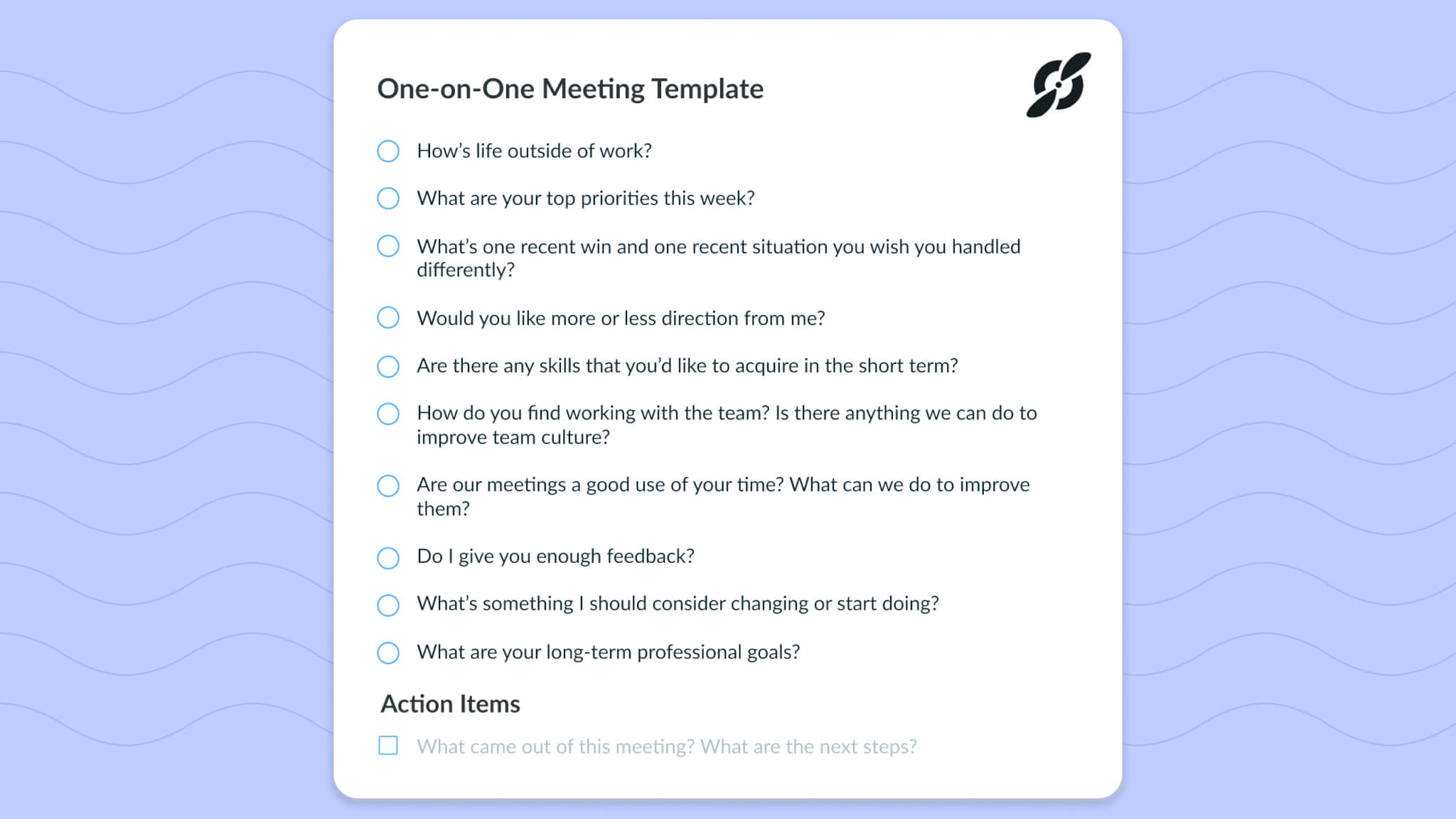





![Binary vs. Adaptive Questions [+ 30 Examples]](https://fellow.app/wp-content/uploads/2022/08/Binary-vs.-Adaptive-Question.jpg)


